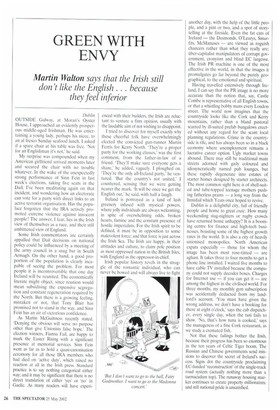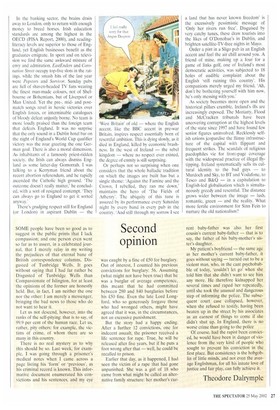GREEN WITH ENVY
Martin Walton says that the Irish still don't like the English . . . because they feel inferior
Dublin OUTSIDE Galway, at Moran's Oyster House, I approached an evidently prosperous middle-aged Irishman. He was entertaining a young lady, perhaps his niece, to an at fresco Sunday seafood lunch. I asked if a spare chair at his table was free. 'Not for an Englishman it's not,' he said.
My surprise was compounded when my American girlfriend arrived moments later and secured the chair with no trouble whatever. In the wake of the unexpectedly strong performance of Sinn Fein in last week's elections, taking five seats in the Dail, I've been meditating again on that incident, and wondering how an electorate can vote for a party with direct links to an active terrorist organisation. Has the populace forgotten that the IRA actively promoted extreme violence against innocent people? The answer. I fear, lies in the Irish view of themselves as a race, and their still embittered view of England.
Some Irish commentators are certainly appalled that Dail decisions on national policy could be influenced by a meeting of the army council in a snug bar in South Armagh. On the other hand, a good proportion of the population is clearly incapable of seeing the problem. For most people it is incontrovertible that one day Ireland will be reunited. The economically literate might object, since reunion would mean subsidising the expensive segregation and constant regeneration required by the North. But there is a growing feeling, mistaken or not, that Tony Blair has promised not to stand in the way, and Sinn Fein has an air of victorious confidence.
As Martin McGuinness recently stated. 'Denying the obvious will serve no purpose other than give Unionists false hope.' The election winners, Fianna Fail, arc happy to mark the Easter Rising with a significant presence at memorial services. Sinn Fein went as far as to hold a quasi-canonisation ceremony for all those IRA members who had died on 'active duty'. which raised no reaction at all in the Irish press. Standard practice is to say nothing categorical either way: and it may be significant that there is no direct translation of either 'yes' or 'no' in Gaelic. As many readers will have experi
enced with their builders, the Irish are reluctant to venture a firm opinion, usually with the laudable aim of not wishing to disappoint.
I tried to discover for myself exactly why these cheerful folk have overwhelmingly elected the convicted gun-runner Martin Ferris for Kerry North. 'They're a proper party for the working classes.' was the first comment, from the father-in-law of a friend. 'They'll make sure everyone gets a share,' he added, vaguely. I ploughed on. 'They're the only all-Ireland party,' he ventured. 'But the country's not united,' I countered, sensing that we were getting nearer the mark. 'It will be once we get the English out,' he said, with half a laugh.
Ireland is portrayed as a land of lush greenery infused with mystical powers, where jolly individuals are always welcoming, in spite of overwhelming odds, broken hearts, famine and the constant presence of hostile imperialists. For the Irish spirit to be defined, it must he in opposition to some malevolent force: and that force is just across the Irish Sea. The Irish are happy, in their attitudes and culture, to claim pole position as most oppressed nation in the British Isles, with England as the oppressor-in-chief.
Irish popular history revels in the struggle of the romantic individual, who can never be bowed and will always live to fight another day, with the help of the little people, and a pint or two, and a spot of storytelling at the fireside. Even the fat cats of Ireland — the Desmonds, O'Learys, Smurfits, McManuses — are viewed as roguish chancers rather than what they really are: fiber-capitalist manipulators of corrupt government, cronyism and blind EC largesse. The Irish PR machine is one of the most effective in the world, in that the images it promulgates go far beyond the purely geographical, to the emotional and spiritual.
Having travelled extensively through Ireland, I can say that the PR image is no more accurate than the notion that, say, Castle Combe is representative of all English towns, or that a whistling bobby mans every London street. The world now imagines that the countryside looks like the Cork and Kerry mountains, rather than a bland pastoral scarred by ill-suited prefab bungalows erected without any regard for the scant local planning regulations. Crime in the countryside is rife, and has always been so in a black economy where unemployment remains a lucrative career option. Ugly market towns abound. There may still be traditional main streets adorned with gaily coloured and idiosyncratically named pub lounges, but these rapidly degenerate into estates of starter homes designed by starter architects. The most common sight here is of shell-suited and tube-topped teenage mothers pushing fatherless prams — a long way from the Innisfail which Yeats once hoped to revive.
Dublin is a delightful city, full of friendly people and home to great craic. How many weekending stag-fighters or rugby crowds have returned home unhappy? It is a booming centre for finance and high-tech businesses, boasting some of the highest growth rates in the world. It is also a city of heavily unionised monopolies. North American expats especially — those for whom the image has been most rose-tinted — are aghast. It takes three to four months to get a phone line installed. I waited five months to have cable TV installed because the company could not supply decoder boxes. Charges for Internet use — if you can get it — are among the highest in the civilised world. For three months, my monthly gym subscription was accidentally deducted from my landlord's account. 'You must have given the wrong address, we don't have a booking for there at eight o'clock,' says the cab dispatcher, every single day, when the taxi fails to show. 'No, that's how tuna is cooked,' says the manageress of a fine Cork restaurant, as we study a cremated fish.
Not that these failings bother the Irish, because their progress has been so enormous in the ten years of Celtic Tiger boom. The Russian and Chinese governments send missions to discover the secret of Ireland's success. Signs dot the countryside proclaiming EC-funded 'reconstruction' of the single-track road system (actually nothing more than a tarmacadam top). The runaway housing market continues to create property millionaires; and still national pride is unsatisfied.
In the banking sector, the brains drain away to London, only to return with enough money to breed horses. Irish education standards are among the highest in the OECD (PISA Report, 2000), and readingliteracy levels are superior to those of England, yet English businesses benefit as the graduates emigrate. In sport and on television we find the same awkward mixture of envy and admiration. EastEnders and Coronation Street occupy top-five slots in the ratings, while the smash hits of the last year were Popstars and Sutvivor. Sunday pubs are full of shaven-headed TV fans wearing the finest man-made colours, not of Shelbourne or Bohemians, but of Liverpool or Man United. Yet the pre-, midand postmatch sons revel in heroic victories over English forces, or interminable catalogues of bloody defeat unjustly borne. No team is more loudly praised than the foreign team that defeats England. It was no surprise that the only sound in a Dublin hotel bar on the night of England's World Cup qualifier victory was the roar greeting the one German goal. There is also a moral dimension. As inhabitants of a famously priest-ridden society, the Irish can always dismiss England as some latter-day Gomorrah. I was talking to a Kerryman friend about the recent abortion referendum, and he rapidly ascended the Catholic high ground. 'The outcome doesn't really matter,' he concluded, with a sort of resigned contempt. 'They can always go to England to get it sorted anyway.'
There's grudging respect still for England (or London) in aspirant Dublin — the 'West Britain' of old — where the English accent, like the BBC accent in pre-war Britain, inspires respect essentially born of resentful ambition. This is dying slowly, as it died in England, killed by economic brashness. In the west of Ireland — the rebel kingdom — where no respect ever existed, the degree of enmity is still surprising.
Or perhaps not so surprising when one considers that the whole balladic tradition on which the images are built has but a single theme: 'Against the Famine and the Crown, I rebelled, they ran me down,' maintains the hero of 'The Fields of Athenry.. The ubiquity of this tune is assured by its performance every Saturday night by every band in every pub in the country. 'And still through my sorrow I see
a land that has never known freedom' is the excessively pessimistic message of 'Only her rivers run free'. Disguised by very catchy tunes, these draw tourists into the likes of O'Donohue's in Dublin, and brighten satellite-TV-free nights in Mayo.
Order a pint in a Sligo pub in an English accent and feel the air chill around you. A friend of mine, making up a four for a game of links golf, one of Ireland's most democratic activities, was subjected to 18 holes of audible complaint about the English 'still ruining this country'. His companions merely urged my friend, 'Ah, don't be bothering yourself with him now, he's only messing with you.'
As society becomes more open and the historical pillars crumble, Ireland's ills are increasingly exposed. The Moriarty, Flood and McCracken tribunals have been uncovering corruption at the highest levels of the state since 1997 and have found few senior figures uninvolved. Recklessly selfish unions jeopardise the flimsy infrastructure of the capital with flippant and frequent strikes. The scandals of religious paedophiles vie for front-page coverage with the widespread practice of illegal flytipping. Ireland systematically sells its cultural identity to the had guys — to Murdoch and Sky, to BT and Vodafone, to Tesco and B&Q — in a capitulation to English-led globalisation which is simultaneously greedy and resentful. The distance grows wider between the image — lush, romantic, green — and the reality. What more fertile environment for Sinn Fein to nurture the old nationalism'?























































































 Previous page
Previous page